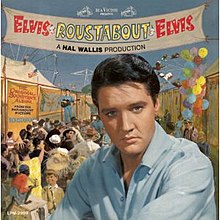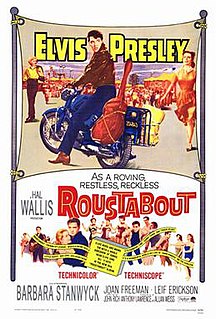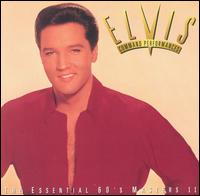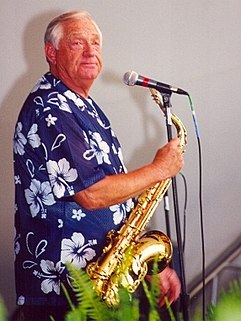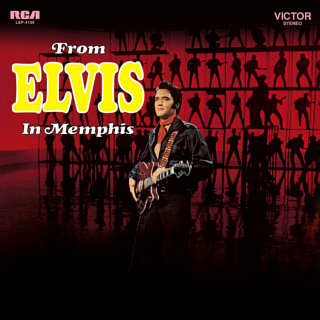
From Elvis in Memphis is the tenth studio album by American rock and roll singer Elvis Presley. It was released by RCA Records on June 17, 1969. It was recorded at American Sound Studio in Memphis in January and February 1969 under the direction of producer Chips Moman and backed by its house band, informally known as "The Memphis Boys". Following the success of Presley's 1968 Christmas television special and its soundtrack, the album marked Presley's return to non-soundtrack albums after the completion of his film contract with Paramount Pictures.

Elvis is the second studio album by American rock and roll singer Elvis Presley, released by RCA Victor in October 1956 in mono. Recording sessions took place on September 1, September 2, and September 3 at Radio Recorders in Hollywood, with one track left over from the sessions for Presley's debut album at the RCA Victor recording studios on January 30 in New York. It spent four weeks at #1 on the Billboard Top Pop Albums chart that year, making Presley the first recording artist to have both albums go straight to number one in the same year. It was certified Gold on February 17, 1960, and Platinum on August 10, 2011, by the Recording Industry Association of America.

His Hand in Mine is the fifth studio album by American singer and musician Elvis Presley, released on RCA Victor Records in mono and stereo, LPM/LSP 2328, in November 1960. It was the first of three gospel music albums that Presley would issue during his lifetime. Recording sessions took place on October 30 and 31, 1960, at RCA Studio B in Nashville, Tennessee. It peaked at #13 on the Top Pop Albums chart. It was certified Gold on April 9, 1969 and Platinum on March 27, 1992 by the Recording Industry Association of America.

How Great Thou Art is the ninth studio album by American singer and musician Elvis Presley, released by RCA Victor in mono and stereo in February 1967. Recording sessions took place at RCA Studio B in Nashville, Tennessee, on May 25, 26, 27, and 28, 1966. It peaked at No. 18 on the Top Pop Albums chart. It was certified Gold on February 16, 1968, Platinum and 2x Platinum on March 27, 1992 and 3x Platinum on October 13, 2010 by the RIAA. The title song won the 1967 Grammy Award for Best Sacred Performance.

Elvis' Golden Records Volume 3 is a greatest hits album by American rock and roll singer Elvis Presley, released by RCA Victor as LPM/LSP-2765 on August 11, 1963. The album was the third volume of an eventual five volume collection, and his eighteenth altogether. It is a compilation of hit singles released in 1960, 1961, and 1962.

Elvis' Gold Records Volume 4 is a greatest hits album by American rock and roll singer Elvis Presley, issued by RCA Victor in mono and stereo, LPM/LSP 3921, in January 1968, with recording sessions taking place over an eight-year span at RCA Studio B in Nashville, Tennessee, and at RCA Studios and Radio Recorders in Hollywood. It is a compilation of hit singles released between 1961 and 1967, peaking at number 33 on the Billboard 200. It was certified Gold on March 27, 1992 by the Recording Industry Association of America.

From Memphis to Vegas / From Vegas to Memphis is the eleventh studio album by American singer and musician Elvis Presley. A double album, it was released in October 1969 by RCA Records, catalogue LSP 6020. The album consists of two discs: the first one contains the live recording of Presley's hits at the International Hotel in Paradise, Nevada on August 24–26, 1969, while the second one contains entirely new material recorded at American Sound Studio in Memphis, on January 13–15 and 21–22, and February 17–18, 1969, and It peaked at number 12 on the Billboard 200, and has been certified Gold on December 13, 1969, by the Recording Industry Association of America.

Loving You is the first soundtrack album by American rock and roll singer Elvis Presley. It was released by RCA Victor Records in mono, LPM 1515, in July 1957 to accompany his first starring film, Loving You (1957). Recording sessions took place on January 15, 16, 17, and 18, 1957, at the Paramount Pictures Scoring Stage, and on January 12, 13, 19, and February 23 and 24, 1957, at Radio Recorders in Hollywood. These are the first sessions where Steve Sholes is officially listed as producer. It spent ten weeks at No. 1 on the Billboard Top Pop Albums chart. It was certified Gold on April 9, 1968 by the Recording Industry Association of America.

"(You're the) Devil in Disguise" is a 1963 single by Elvis Presley which was written by Bill Giant, Bernie Baum and Florence Kaye. It was published by Elvis Presley Music in June 1963.

Blue Hawaii is the fourth soundtrack album by American singer Elvis Presley, released on RCA Victor Records in mono and stereo, LPM/LSP 2426, on October 20, 1961. It is the soundtrack to the 1961 film of the same name starring Presley. In the United States, the album spent 20 weeks at the number one slot and 39 weeks in the Top 10 on Billboard's Top Pop LPs chart. It was certified Gold on December 21, 1961, Platinum and 2x Platinum on March 27, 1992 and 3x Platinum on July 30, 2002 by the Recording Industry Association of America. On the US Top Pop Albums chart Blue Hawaii is second only to the soundtrack of West Side Story as the most successful album of the 1960s.

"You'll Be Gone" is a song co-written by Elvis Presley and published by Elvis Presley Music and released in 1965 on the Girl Happy soundtrack album and as a 45 single. The song was recorded in 1962 and is significant because it was co-written by Elvis Presley, with his bodyguard Red West and Charlie Hodge. The other song that Elvis Presley composed was "That's Someone You Never Forget" in 1961 with Red West, which was on the Pot Luck LP released in 1962.
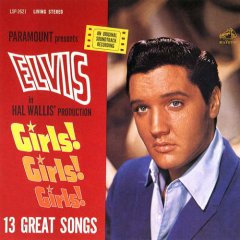
Girls! Girls! Girls! is the fifth soundtrack album by American singer and musician Elvis Presley, released on RCA Victor Records in mono and stereo, LPM/LSP 2426, in November 1962. It accompanied the 1962 film of the same name starring Presley. Recording sessions took place at Radio Recorders in Hollywood on March 26, 27, and 28, 1962. It peaked at number three on the Top LP's chart. It was certified Gold on August 13, 1963 by the Recording Industry Association of America.

Kissin' Cousins is the eighth soundtrack album by American singer and musician Elvis Presley, released by RCA Victor in mono and stereo, LPM/LSP 2894, in April 1964. It is the soundtrack to the 1964 film of the same name starring Presley. Recording sessions took place at RCA Studio B in Nashville, Tennessee, on May 26 and 27, and September 29 and 30, 1963. It peaked at number six on the Billboard Top LP's chart. The album was certified Gold on March 27, 1992 by the Recording Industry Association of America.

Girl Happy is the tenth soundtrack album by American singer and musician Elvis Presley, released on RCA Victor Records in mono and stereo, LPM/LSP 3338, in March 1965 – the March 1 date is disputed. It is the soundtrack to the 1965 film of the same name starring Presley. Recording sessions took place at Radio Recorders in Hollywood, California, on June 10, 11, 12, and vocal overdubs by Presley on June 15, 1964. It peaked at number eight on the Top LP's chart. It was certified Gold on July 15, 1999 by the Recording Industry Association of America.

Harum Scarum is the eleventh soundtrack album by American singer and musician Elvis Presley, released by RCA Victor in mono and stereo, LPM/LSP 3468, in November 1965. It is the soundtrack to the 1965 film of the same name starring Presley. Recording sessions took place at RCA Studio B in Nashville, Tennessee, on February 24, 25, and 26, 1965. It peaked at number eight on the Top LP's chart.

Frankie and Johnny is the twelfth soundtrack album by American singer and musician Elvis Presley, released on RCA Victor Records in mono and stereo, LPM/LSP 3553, on March 1, 1966. It is the soundtrack to the 1966 film of the same name starring Presley. Recording sessions took place at Radio Recorders in Hollywood, California, on May 12, 13, and 14, 1965. It peaked at number 20 on the Top LP's chart. It was certified Gold and Platinum on January 6, 2004 by the Recording Industry Association of America.

Spinout is the fourteenth soundtrack album by American singer and musician Elvis Presley, released by RCA Victor in mono and stereo, LPM/LSP 3702, on October 31, 1966. It is the soundtrack to the 1966 film of the same name starring Presley. Recording sessions took place at Radio Recorders in Hollywood, California, on February 16 and 17, 1966. It peaked at number 18 on the Top Pop Albums chart.

Clambake is the sixteenth soundtrack album by American singer and musician Elvis Presley, released by RCA Victor in mono and stereo, LPM/LSP 3893, in October 1967. It is the soundtrack to the 1967 film of the same name starring Presley. He entered RCA Studio B in Nashville, Tennessee on February 21, 1967 for Recording sessions for his twenty fifth film. Supplemental material sessions took place on September 10 and 11, 1967. It peaked at number 40 on the Billboard 200.

Viva Las Vegas is an EP by American singer Elvis Presley, containing four songs from the 1964 motion picture, Viva Las Vegas. It was released by RCA Victor in May 1964 to coincide with the film's premiere. The soundtrack EP made the Billboard Hot 100 at #92, the lowest-charting release of Presley's career to this point. RCA had not released a Presley EP single in two years; given that it was a dying format, and given the disappointing chart performance of Viva Las Vegas, the company would only issue two more for the remainder of Presley's career.
